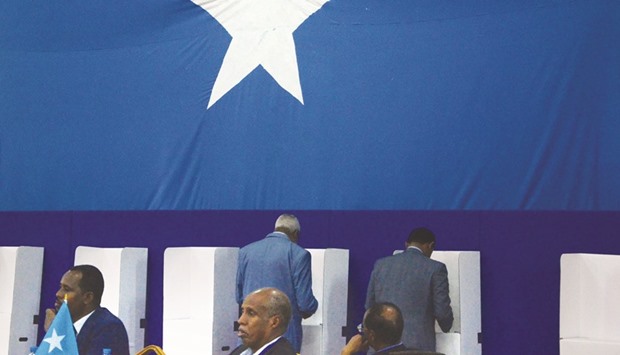Somali lawmakers voted for the country’s president yesterday, gathering in the safety of Mogadishu’s heavily fortified airport after months of delays and following threats from insurgents bent on derailing the elections.
The voting process, which lasted months, began with 14,000 elders and regional figures choosing 275 members of parliament and 54 senators, who then began casting ballots to choose between President Hassan Sheikh Mohamud or one of his 20 rivals.
Newly reappointed parliament Speaker Mohamed Sheikh Osman Jawari announced results of the first round of voting in a hall full of lawmakers and diplomats, protected by the airport’s blast walls and guarded by an African Union peacekeeping force. He said three candidates would battle it out in the second round: President Mohamud, former prime minister Mohamed Abdullahi Farmajo and former president Sharif Sheikh Ahmed. A fourth candidate dropped out.
Unless one contender secures a sweeping victory in the second round, a final round will see the top two face off to lead a nation that is trying rebuild after more than two decades of war and chaos.
Pervasive corruption is one of the biggest complaints among ordinary Somalis and Western donors. Rival candidates accuse each other of buying the loyalty of lawmakers. Anti-corruption group Marqaati says tens of thousands of dollars have been handed to individuals to secure support in the vote.
Western donors, who have often criticised President Mohamud’s government for corruption, say the vote is far from perfect but say it marks a modest step forward from 2012 when just 135 elders picked the lawmakers, who chose the president.
The threat from Al Shebaab rebels, who regularly launch attacks in Mogadishu and elsewhere, meant the government and its Western backers scrapped a plan to give each adult a vote due to the challenge of securing polling stations.
Several blasts, probably from mortar bombs, echoed across the seaside capital Mogadishu late on Tuesday. But there were no reports of casualties in the city, which had been subject to heavy security ahead of the vote.
Al Shebaab, which ruled Somalia for several years, has been slowly driven out of its strongholds in a campaign by AMISOM and Somali troops. But its fighters launch regular gun and bomb attacks in their bid to topple the government and impose their strict interpretation of Islam.
The long, drawn-out election has largely consisted of horsetrading between different clans, with widespread allegations of vote-buying and corruption, leaving it a distant process to the average Somali, who is also unlikely to see much benefit from its outcome.
The country, renowned as the world’s foremost failed state, in 2012 held the first elections inside its own borders sine the 1991 overthrow of Siad Barre’s military regime which led to decades of anarchy and the rise of the Shebaab. Then 135 clan elders picked the lawmakers who went on to elect the president.
In 2016 Somalia had been promised a one-person, one-vote election. However political infighting and insecurity saw the plan ditched for a limited vote running six months behind schedule.
Although the election is billed as its most democratic in nearly five decades, only 14,000 delegates were able to vote for lawmakers in a drawn out process marred by accusations of vote-buying and corruption.
Those lawmakers — 275 lower house MPs and 54 senators — are now electing the new president.

Somali lawmakers cast their vote to elect a new president inside Mogadishu airport yesterday.
